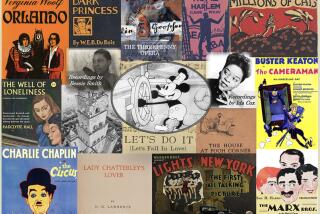Magazine Broke Law, Court Says : Violation of Copyright Cited in Ford Excerpts
- Share via
WASHINGTON — The Supreme Court ruled Monday that the Nation magazine violated federal copyright law when it printed key excerpts from a purloined manuscript of a book by former President Gerald R. Ford.
In a 6-3 decision, the court rejected the contention that using such material before publication was “news reporting” protected by the First Amendment and said the magazine had exceeded “fair use” of the material in its 1979 bid to “scoop” the book’s authorized publishers.
The Nation used more than 300 words verbatim from the manuscript in its article on Ford’s account of the pardon he gave former President Richard M. Nixon.
The justices refused to accept the magazine’s contention that it had quoted only newsworthy factual material and was therefore protected against a suit for copyright violation. They called the Nation’s actions “piracy” and upheld the right of former officials and other public figures, like all authors, to tell their story first.
“(Without copyright) protection, there would be little incentive to create or profit in financing such memoirs and the public would be denied an important source of significant historical information,” Justice Sandra Day O’Connor wrote for the court. “ . . . In our haste to disseminate news, it should not be forgotten that the framers (of the Constitution) intended copyright itself to be the engine of free expression.”
In dissent, Justice William J. Brennan Jr., joined by Justices Byron R. White and Thurgood Marshall, warned that the decision could “stifle the broad dissemination of ideas and information” and inhibit “robust public debate.”
The case presented the court with a classic conflict between the Constitution’s guarantee of freedom of the press and the copyright law’s protection of a publisher’s property and an author’s creative work. In briefs to the court, news organizations sided with the Nation, contending that a book like Ford’s--dealing with important national events--was a legitimate subject for news reporting.
Support Publishers
On the other side, the book industry backed Harper & Row and the Reader’s Digest Assn., the authorized publishers, arguing that copyright protections must be upheld to provide economic and creative incentive to publish.
Attorney Floyd Abrams of New York, representing the Nation, said the decision would deny the public the opportunity “to learn the facts about the most significant events involving their government as soon as those facts can be learned.”
Abrams said a change in the copyright law may be necessary to assure that former government officials “have no special claim” to deciding when information they learned in office is made public.
But Brooks Thomas, president of Harper & Row, praised the ruling. “It proves once and for all that you cannot appropriate another person’s expression merely by calling it news,” he said in a statement. “Far from being a defeat for the First Amendment, it is a victory for free expression and the right of authors to benefit from the first publication of their own works.”
Copyright law protects expression--such as a writer’s analysis or choice of words--but not the ideas or facts he presents. And under the doctrine of “fair use,” some copyrighted material may be used by others--depending on the nature of the work and the amount, purpose and economic impact of its use.
Harper & Row reached an agreement with Ford in 1977 to publish his account of Watergate, the Nixon pardon and other events during Ford’s presidency. Two years later, the publishers sold the right to print excerpts of the book, “A Time for Healing,” to Time magazine for $25,000--half in advance, the rest at the time of publication.
But shortly before the Time article was to come out, an unidentified source provided the Nation, a weekly journal of political commentary, with an unpublished 200,000-word manuscript of the book. The Nation quickly published its own 2,250-word article, which included direct quotations, and Time canceled its article and refused to pay the remaining $12,500 it owed Harper & Row.
Told to Pay Damages
The book firm then brought suit and a federal District Court in New York ordered the Nation to pay $12,500 in damages for copyright infringement. But a federal appeals court reversed the decision, finding that the magazine’s article represented “fair use.” The appellate court said copyright law should not be used to “impede the harvest of knowledge so necessary to a democratic state.”
The Supreme Court reinstated the award against the magazine (Harper & Row vs. Nation Enterprises, 83-1632). In using “generous” verbatim excerpts, the Nation had effectively appropriated the important marketable right of first publication, O’Connor said. The public’s interest in the memoirs did not excuse “the piracy of verbatim quotations for the purpose of ‘scooping’ the authorized first serialization,” she said, noting that the quotes, focusing on the pardon, were “essentially the heart of the book.”
The court said that while the Nation had the right to try to publish information first, it had gone beyond that and “actively sought to exploit the headline value of its infringement, making a ‘news event’ out of its unauthorized first publication of a noted figure’s copyrighted expression.” The magazine stood to profit from exploiting the material “without paying the customary price,” it said.
In other action, the justices:
--Rejected a petition by California authorities seeking review of a 1984 state Supreme Court ruling that struck down a jury instruction that could imply that convicted murderers could be barred from parole only if they were sentenced to death.
The instruction, no longer in use, required judges to tell jurors that the governor can commute a sentence of life without parole. Jurors were not told that the governor can also commute a death sentence.
The state court first invalidated the instruction in 1982 on the grounds it violated the federal Constitution--but the high court reversed that ruling. The state court struck down the instruction again last year, but this time based its ruling on the state Constitution, an action that ordinarily precludes federal review.
State Atty. Gen. John Van de Kamp urged the justices to overturn the latest ruling (California vs. Ramos, 84-1227).
--Agreed to review next term an Illinois law that required physicians performing abortions to use methods that would likely save a viable fetus. The law, recently ruled unconstitutional by a federal appeals court, also required doctors to tell patients that some methods of birth control are “abortifacients” that, unlike contraceptives, cause fetal death after conception. Such methods, such as the IUD, prevent implantation of a fertilized egg in the womb (Diamond vs. Charles, 84-1379).
More to Read
Sign up for our Book Club newsletter
Get the latest news, events and more from the Los Angeles Times Book Club, and help us get L.A. reading and talking.
You may occasionally receive promotional content from the Los Angeles Times.










